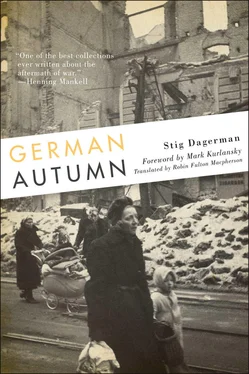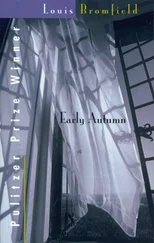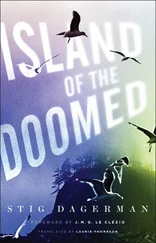‘We greeted the Englishmen as liberators, but they can’t have realized that. We were willing to do everything, to get not the old Germany but a new democracy on to its feet. But we weren’t allowed to. And now we are disappointed in the English because we have a definite impression that they are sabotaging the process of renewal, and indifferent to what is happening because they are stronger than we are.’
‘We’ — that can mean the Liberal Party, which in North Germany is rather small but has a good reputation on account of its anti-Nazi attitude, but which in South Germany is large and suspect for there we can hear it said ‘Think Liberal, act Socialist and feel German.’ But ‘We’ can mean much else. ‘We’ can be those middle-class German intellectuals who were at heart anti-Nazi but never had to suffer for this and perhaps never wanted to suffer for it, who never voluntarily went against the grain and are now bearing a kind of anti-Nazi jalousie de metier against the legitimated anti-Nazis, those who were politically persecuted. Having two consciences in one’s breast, one good and one bad, promotes neither ideological nor psychological clarity. Disappointement and conscious disillusionment are without doubt the simplest way out for such a dilemma of the soul.
The author is more flexible by constitution and laughingly tells us that the programmes of the different parties are still so obscurely couched that people will turn up at the wrong election meeting and only at the exit, even if then, notice that they have visited the Social Democrats instead of the Christian Democrats or the Liberal Democrats instead of the Conservatives. He himself illustrates the ideological confusion in an apt and amusing way. He claims to have been born an anti-Nazi but yet he has voted for the CDU, the party which calls itself Christian and is said to have gathered pretty well all of the former Nazis under its cross in the hope of avoiding a planned economy and the loss of their money. But in order to salve his conscience he has persuaded his sister, who is Conservative but lacks money, to stand in for him and vote for the Social Democrats.
The habit of writing optimistic novels persists, although it is fifteen years since the last one. He assures us on his honour that at the most a mere one per cent of the German ‘quality’ were Nazis, where-upon the lawyer drily laments the lack of ‘quality’ in Germany. The latter goes on to accuse the English: he says that through a deliberate policy of starvation they have demoralized the population to just as great an extent as the Nazis did, they have ‘made bad people worse and good people uncertain’, with the consequence that they are driven into the arms of whatever suspect movement you can name, so long as it undertakes to solve their immediate material problems.
It is, of course, a bitter truth that hunger is unamenable to any form of idealism. The work of ideological reconstruction in Germany today meets the strongest opposition not in those who are consciously reactionary but in the indifferent masses who are letting questions of political persuasion wait until they have been fed. Allowing for this, the most polished election propaganda is content to promise, after victory at the polls, not peace and freedom, but a proper larder, proof against rats and thieves, and Germany’s best-known loaf is the one that appeared, with a sharp bread-knife, on the Communist posters in the autumn of 1946. One rainy day in October when General Koenig, the liberator of Paris, stepped out under the bullet-riddled canopy of Hamburg’s Central Station, both he and the nervous British guards, officers with white sleeve-covers up to their elbows and plenty of red both on their cheeks and on their parade uniforms — all were observed by dense rows of the unemployed of Hamburg. When the long cortege of cars drew away with angry tootings the young German police lads were surrounded by people scornfully shouting ‘What did he bring? Chocolate? Or bread?’ And the representatives of the powers of law and order blushed beneath their leather helmets.
To blush — that, until further notice, is all that the parties can do when the masses demand some end to their material difficulties. But there are more becoming and less becoming ways of blushing. One of the less becoming is the middle-class insistence on the dissolution of the class society, though at heart one knows perfectly well that they don’t mean it. The cake of bad German bread offered by the lawyer and the author is in fact a symbolic cake, a liberal cake whose imitation cream is intended to camouflage all too bitter facts. It is without doubt a cake for the least poor. The most poor do not eat bread that way.
This symbolic cake implies one of the reasons why the labour parties are evolving their strategies along the lines of class struggle and why certain groups in the trade union movement have the foresight to expect hitherto unseen social conflicts when the occupying powers eventually give Germany a free rein. To find more concrete evidence you can take a ride on one of Hamburg’s underground trains, where you can travel second class along with relatively well-dressed and relatively well-maintained citizens, and third class along with ragged citizens whose faces are white as chalk or paper, faces which look as if they could never blush, faces which, you might think, would not even bleed if they were cut. These, the whitest faces in Germany, most definitely do not belong to the class of the least poor.
Sink a little! Try to sink a little! When it comes to the art of sinking then there are worse and better artists. In Germany there are bad practitioners who keep themselves alive only by the thought that since they have so little to live for they have even less to die for. But there are surprisingly many who are willing to accept anything merely to survive.
On Sundays outside the Zoo Station in Berlin a ragged and blind old man sits playing shrill psalm-tunes on a little portable organ. He sits bare-headed in the cold and listens sorrowfully down in the direction of his shabby cap on the pavement, but the German coins make a faint dull clink and only rarely do they fall in the caps of the blind. It would of course be a little better for him if he did not play the organ and above all if he did not play psalms. On weekday afternoons when the people of Berlin draw past with their small creaking hand-carts after yet another day of hunting for potatoes or firewood in the less harrowed suburbs the blind man has exchanged his harmonium for a barrel-organ, and the coins drop more frequently, but on Sunday he insists with quite uneconomic idealism on using his squeaky harmonium. On Sundays he cannot accept his hurdy-gurdy. He still has a little bit further to sink.
But in the stations it is possible to meet people who have passed most of the stages. The big German railway stations, once the scene for mannequin shows and adventures, contain between their scarred walls and beneath their cracked roofs a high percentage of the sum of hopelessness. In rainy weather the stranger is always surprised to see and hear the rain pattering down through the waiting-room roof and forming lakes on the floor between the benches. It seems like a tiny revolution in this disciplined chaos. At night the stranger will start as he stumbles against refugees in the concrete tunnels, refugees from the east or from the south, lying stretched out on the naked floor along the naked walls and either sleeping heavily or sitting crouched among their poor bundles and waiting all too wide awake for a train that will take them to a new station, just as hopeless as this one.
The underground stations in the big cities have come through in better shape. They are rundown but unscathed. Berlin’s Untergrundbahnstationen smell of wetness and poverty, but the trains run promptly as in peacetime. One does not turn to stare at the foreign soldiers walking the platforms with well-dressed but badly painted German girls who are already speaking perfectly whiny American or quick conciliatory English. Many of these girls stand leaning against the sides of the train-doors trying to catch as many eyes as possible with their provocative glances and telling their English soldier that the people here have no sense; others prop up their drunk American friend and make eyes that say: ‘What can a poor girl do?’ The smoke from their Allied cigarettes blends inside the compartments with the smoke of the German cigarettes, which tastes sour and stifling, and gives the underground trains their persistent smell of dirt and destitution. But when the underground trains come up into the sharp light of day these girls too have faces with the shadows of hunger. And it happens — rarely, no doubt, but it does happen — that someone says: ‘That’s what the future of Germany looks like! A drunk pimply American and a whore of a German girl!’
Читать дальше












